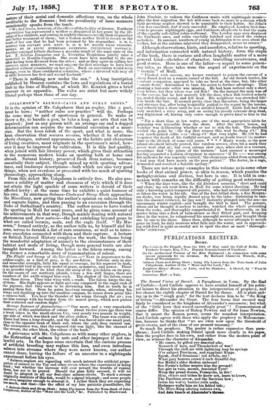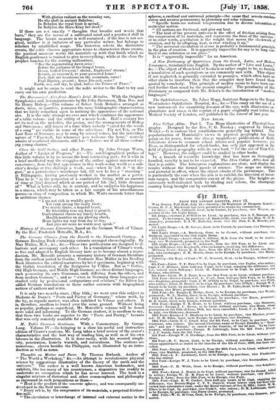PUBLICATIONS RECEIVED.
Boole.
The Crisis in the Punjab, from the 10th of May until the Fall of Delhi. Hy Frederic Cooper, Esq. C.8., Deputy Commissioner of umritsur.
On the Authorized Version of the New Testament : in connexion with some recent proposals for its revision. By Richard Chenevix Trench, DX.. Dean of Westminster.
Salmon Casts and Stray Shots ; being Fly Leaves from the Note-book of John Colquhoun, Author of the " Moor and the Lock," &c.
Laighton Manor House ; or Love, and its Shadows. A Sketch, by " Puss in the Corner."
Garestone Hall : a Tale.
The Second Vision of Daniel. A Paraphrase in Verse. By the Earl of Carlisle.—Lord Carlisle appears to have availed himself of his politi- cal leisure to direct his attention to the interpretation of prophecy, and has chosen the eighth chapter of Daniel for his theme. All is plain sail- ing up to the "rough goat," for the text declares him to be "the King of Grecia "—Alexander the Great. The four horns that succeed may fairly be considered as the kingdoms of Alexander's successors ; but what of the "little horn that waxed exceedingly great" ? Commentate= of course differ. The opinion of Bishop Newton and of Sir Isaac Newton, that it meant the Roman power, seems the soundest interpretation. Lord Carlisle agrees with those who apply the prophecy to Mahometan- ism, because he thinks that "we are even now upon the threshold of great events, and of the close of our present economy." So much for prophecy. The poetry is rather expansion than para- phrase ; Lord Carlisle making Daniel speak more clearly in Ma pages, than the prophet does in his own, and rather from the modern point of view, as witness the character of Alexander.
" He comes, by gifted eye descried afar, Monarch of men, and Thunderbolt of war !
Through the cleft air with lightning leap he springs O'er subject Provinces, and suppliant Kings.
Speak, char d Granieus ! red Arbela, say!
1 hat gory horrors crown'd each dreadful day. See Media's elder diadem unbound !
See Persia's loftier sceptre kiss the ground !
Sea-girt is vain, mourn, desolated Tyre!
Wrap thy proud domes, Persepolis, in fire ! Him, climes and tribes he knew not, learn to know,
The Partin= arrow, and the Bactrian bow;
Indus his wat'ry barrier:rolls aside, Hydaspes wafts him on his fabled tide; The Hero-King adoring nations own,
And Aria kneels at Alexander's throne.
With glories radiant as the noonday sun, He sits aloft in ancient Babylon; In Babylon the royal feast is spread, In Babylon the Hero-King lies dead."
If these are not exactly " thoughts that breathe and words that burn," they are the verses of a cultivated mind and a practised skill in language. The heroic measure is well sustained ; if the line is not ori- ginal, neither is it imitative of any particular writer, but belongs to scholars by established usage. The historian selects the distinctive events, the critic chooses appropriate terms to characterize those events, the poetical amateur works the materials up with that finish which an English gentleman is trained to give to everything; while at the close the prophet vouches for the coming millennium. " See the regenerating dawn arise!! Before the radiance of the Gospel beam, Down, battled Crescent ! shrink, Euphrates' stream! Return, ye ransom'd, to your promised home ! Feet, that are beauteous on the mountain, come! Foul Bigotry, avaunt ; fierce Discord, cease ! Earth, sea, and sky, be glad, before the Prince of Peace."
It might not be amiss to send the noble writer to the East to try and carry out his own prediction.
The Harmonized Airs from 3foore's Irish Melodias. With the Original Symphonies and Accompaniments by Sir John Stevenson, Mus. Doc. and Sir Henry Bishop.—This volume of Select Irish Melodies arranged as duets, trios, or quartets, possesses the same bibliographic characteristics, that we lately remarked upon in noticing the appearance of the national airs. It is the only attempt we ever met which combines the appearance of a table volume and the utility of a music book. Half a century has set its seal on the melodies, the poetry, and the arrangements of Bishop and Stevenson ; still traces of a time when nobody " cared for the words of a song" are visible in some of the selections. Fly not Yet, or The Last Rose of Summer, may be sung by several voices, but the individual nature of " Farewell, but whenever you welcome the hour," scarcely admits of combined utterances, still less "Believe me if all those endear- ing young charms."
Clare the Gold Seeker, and other Poems. By John George Watts, Author of " Lyrics of Progress," &c.—The autobiographical preface of this little volume is by no means the least interesting part ; for it tells in a brief unaffected way the struggles of the author against untoward cir- cumstances, from his first appearance in this work-a-day world as a soli- citor's drudge at five shillings a week, and—when he lett it " in dis- gust," as a pawnbroker's warehouse lad, till now he has a " standing " at Billingsgate, having previously worked in the market as a porter. Thus he is in the possession of a comfortable living, with an amount of time at [his] disposal which at one period of life [he] little dreamed of." What is better still, he is content, and lie analyzes his happiness in a stanza, which may be taken as a fair sample of his miscellaneous poems—a Class of composition in which Mr. Watts succeeds better than in ambitious themes.
" I am not rich in worldly goods Yet rank among the really blest ; I've sturdy limbs, a hopeful heart, By friendship true my hand is press'd. Contentment cheers my lonely hearth, Health mantles on my glowing cheek, Hope lights my way from day to day, And joys are mine no words may speak."
- History of German Literature, based on the German Work of 'Minim By the Rev. Frederick Metcalfe, M.A., &c.
The German Classics from the Fourth to the Nineteenth Century. A German Reading Book containing extracts arranged chronologically. By Max Muller, M.A., &c., &c.—These two publications are designed to il- lustrate and accompany each other. In a translation of Vilmar's work, so free and adapted to English literary taste as to become almost a repro- duction, Mr. Metcalfe presents a summary history of German literature from the earliest period to Goethe. Professor Max Miiller in his Reading Book illustrates the critical narratives by brief specimens, beginning with the Gothic translation of the Scriptures by Ulfilas. But as " Gothic, Old High German, and Middle High German, are three distinct languages, each possessing its own Grammar, each difering from the others, and from modern German" ; and as " even in Germany these languages arc studied only by professional antiquarians and scholars," the Editor has added German translations to these earlier extracts with biographical notices of authors and notes.
It is only two months since, (May 15th,) we went over this subject in Madame de Pontes "Poets and Poetry of Germany," whose work, by the by, as regards matter, was often indebted to Vilmar and others. It is, therefore, needless to travel over the same ground. Without being so popular, perhaps so superficial, Mr. Metcalfe's volume will be found more solid and informing. To the German student, it is needless to say, that these two hooks are superior to the " Poets and Poetry," because that was only remotely available for study.
M. Tullii Ciceronis Orations. With a Commentary. By George Long. Volume IV.—In bringing to a close his useful and instructive edition of Cicero's orations, Mr. Long takes a brief review of the orator's characteristics and the best way of reading him, as well as of his own labours in the illustration. It is done racily, with his wonted simpli- city, penetration, homely warmth, and naturalness. The orations are numerous; eleven besides the Philippics, each illustrated by an intro- duction as well as notes. '
Thoughts on Matter and Force. By Thomas Ewbank. Author of " The World a Workshop," &e.—An attempt to revolutionize physical science by suggestions illustrative of the theory of the earth and the universe.' The author is a well known American bookmaker, and exhibits, like too many of his countrymen, a disposition too readily to undertake an occupation which he has never learned. The book is a singular mixture of rhetorical and other commonplaces and philosophy as expressed in such propositions as these- " Heat is the product of the concrete spheres, and was consequently un- developed in the fluid universe. /ire" Every orb is, by the compression of its materials, a perpetual friction- -mill.
" The circulation or interchange of internal and external matter in the spheres, a cardinal and universal prineiplo—the cause that arrests conden- sation and secures permanency to planetary and solar volumes. " Specific heats are natural temperatures due to diverse intensities of molecular motion.
"All motions are frictional, and give out heat.
" The heat of the present universe is the effect of friction arising from the compression of its materiels, and represents the force of the universe : or in other words, gravitation is the weight that moves the clockwork of creation, and by its offspring, heat, is ever winding it up."
" The universal circulation of atoms is probably a fundamental principle
i
in the plan of creation. It is apparently impossible for any to be long con. fined to one substance or one place."
It is " apparently impossible" for an American.
A New Dictionary of Quotations from the Greek, Latin, and modem Languages, translated into English. By the author of " Live and Learn," &c.--The object of these kind of books is or rather ought to be, to furnish a translation of such quotations as are commonly met with. This object if not neglected, is generally extended to passages, which often have no other claim to insertion than that the compiler may have found them quoted by somebody. This principle of medley seems to have been car- ried further than usual by the present compiler. The peculiarity of this Dictionary as compared with Mr. Bohn's is the introduction of "modern languages."
The Ophthalmoscope. By Jabez Hogg, Assistant Surgeon to the Royal Westminster Ophthalmic Hospital, &c., &e.—This essay on the use of a new instrument for examining diseases of the eye, with illustrative ex- planations and cases, is the reprint of a paper originally read before the Medical Society of London, and published in the Lancet of last year.
NEW ATLAS.
Eton College Atlas. Part I. Ten Maps illustrative of Physical Geo- graphy. Designed by the Rev. C. G. Nieolay ; engraved by Edward Weller.--It is curious that establishments generally lag behind. The popularization of Humboldt's views in physical geography has been going on for years, from the almost magnificeni; publications of Keith Johnstone down to common school atlases and popular lectures; yet Eton, so distinguished for school-books, has only just appeared in the field of physical geography with its own book " for the use of Eton Col- lege." However, the subject could be studied in other books. In a branch of scientific knowledge that has been so thoroughly handled, novelty is not to be expected. The Eton College Atlas does all that is possible. The letterpress explanations are clear, and display the results without the formal parade of science. The maps are distinct and pictorial in ef&ct, where the object admits of the picturesque. This is particularly the case when the aim is to exhibit the direction of moun- tain ranges, and the comparative extent of the plains. The heights are extremely well-indicated both by shading and colour, the chimpaiga country being brought out by contrast."



























 Previous page
Previous page